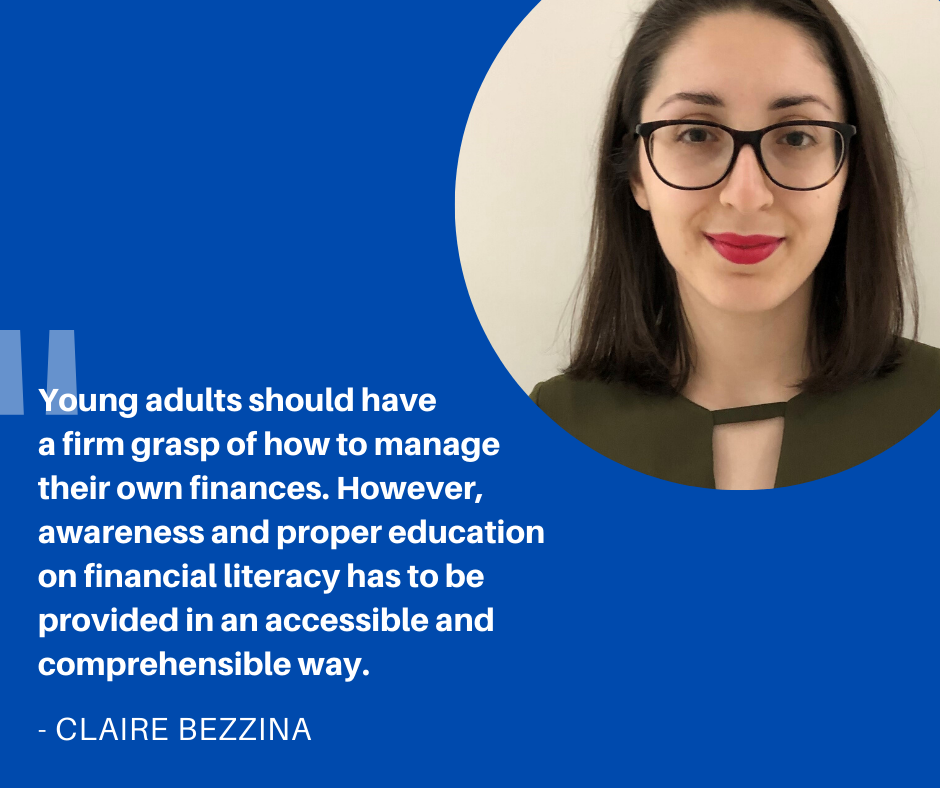INVEST+ Competition – MEET CLAIRE BEZZINA

Why do you think financial literacy is important? What steps should be taken to improve the level of financial literacy, especially amongst young people?
Opinion Piece by Claire Bezzina
–
For numerous people, the financial world is extremely intimidating – perceived as a complex world made up of intricate jargon and notions unintended to be understood by simple human beings. However, regardless of these beliefs, financial literacy is and will remain at the core of people’s needs to secure a healthy financial life. I, for one, had no particular knowledge of my personal finances up until a few years ago. This, however, all changed when I took on my first full-time job which led me to start educating myself on the world of money.
Financial literacy is a term that has become increasingly important in this day and age. According to the National Financial Educators Council, financial literacy is defined as “possessing the skills and knowledge on financial matters to confidently take effective action that best fulfils an individual’s personal family and global community goals”. Simply put, financial literacy is the ability to live from on pay check to another free from debt and poor financial decisions while being able to save, invest and budget.
Clearly, financial literacy is a valuable skill to have in life. Despite this, according to a study held by JA Europe showed that 94% of young people are frequently missing financial skills when they start their working lives. This fact comes as no surprise. Young people are constantly being faced with new digital trends leading to an increasingly virtual concept of money – thus resulting in less tangible and more complex idea of money. This is a challenging scenario that Europe and the rest of the world has to face. Therefore it is the duty of banks and financial institutions to improve the level of financial literacy.
The first step that should be taken before even providing any source of direct help, is for banks and financial institutions to create awareness among people on their lack of knowledge on financial literacy. Awareness on this subject matter may generate a sense of curiosity among people, thus becoming more interested in gaining knowledge on financial literacy. Creating awareness can be done through various means. One way for banks and financial intuitions to do this is by laying out an effective awareness campaign that can be delivered on various social media platforms. This can take different forms from Facebook and Instagram sponsorships to YouTube advertisements. Once people become aware of their lack of knowledge on this topic, they will than feel the need to start educating themselves on their finances.
The minute people become aware of and acknowledge their lack of knowledge on financial literacy, financial institutions and banks can move onto the second step – financial education. Financial education is key in improving financial literacy among people of all ages. Such education can be provided in various ways. Firstly, financial education has to start from an early age. Therefore, banks and financial institutions can start off by providing financial educational programmes at schools. This will help children grasp a solid concept of financial literacy from a young age which than can lead to a successful financial knowledge once these children grow older.
Secondly, banks and financial institutions can provide online classes or seminars specifically organised for young adults. These classes or seminars can particularly focus on multiple topics that are of interest to young people such as retirement planning, wealth management and financial management. By providing these classes and seminars through an online means will perhaps make it more attractive for young people’s participation.
At this stage, people are now aware of their situation and are trying to find means to improve their level of financial literacy. This therefore leads us to the third step – to challenge people to utilise their newly gained financial skills and knowledge on the banks’ financial products. Banks can provide a range of products that best suit their consumer needs, habits and wants. Therefore, with their newly gained knowledge, people would be able to take effective action, analyse the products and apply their knowledge when choosing the products that best fit their financial life.
Lastly, once financial institutions and banks take such measures to educate young people on financial literacy, it is up to these institutions or banks to follow through on what they have started. Once people start applying and adopting their new knowledge, financial institutions can start rewarding their consumers for their accomplishments and efforts. In this way, banks can keep in contact with their consumers and assist them with any financial assistance they might need along the way.
I used to belief that financial literacy is something that is figured out as one grows older. It turns out that financial literacy is actually something that one has to learn. Financial literacy is a crucial life skill for today’s world in order to properly live, thrive and be independent in the modern economy. Young adults should have a firm grasp of how to manage their own finances. However, awareness and proper education on financial literacy has to be provided in an accessible and comprehensible way. This is the role that banks and financial institutions have to play in order to build generations capable of taking effective financial decisions that best suit their life and way of living. Once young adults acquire this knowledge, they can build a strong foundation for both their personal and professional goals.

